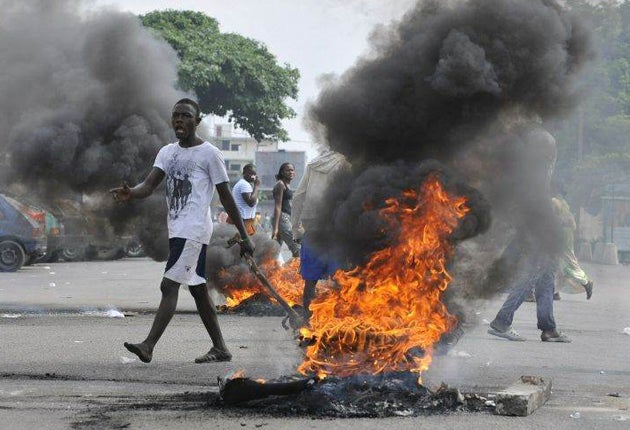Power struggle over poll leads to armed clashes in Ivory Coast

Your support helps us to tell the story
This election is still a dead heat, according to most polls. In a fight with such wafer-thin margins, we need reporters on the ground talking to the people Trump and Harris are courting. Your support allows us to keep sending journalists to the story.
The Independent is trusted by 27 million Americans from across the entire political spectrum every month. Unlike many other quality news outlets, we choose not to lock you out of our reporting and analysis with paywalls. But quality journalism must still be paid for.
Help us keep bring these critical stories to light. Your support makes all the difference.
Street gun battles in Ivory Coast's main city, Abidjan, left at least four dead yesterday as supporters of the man widely recognised as the winner of last month's presidential poll tried to wrest control of key state institutions from the incumbent, Laurent Gbagbo.
A senior opposition official cited a higher figure of 18 killed, while the US State Department added that a rocket propelled grenade struck the American embassy. Outside Abidjan, rebels supporting the challenger, Alassane Ouattara, exchanged fire with the army. "There is shooting all over the place. There is artillery, there are explosions," one witness told Reuters.
The escalation of violence raises concerns that the West African country, formerly a haven of stability in a troubled region and the posting of choice for French expatriates, could slip back into full-scale civil war. A resumption of the 2002-03 conflict that split Ivory Coast between its north and south would have an impact beyond the country's borders, destablising fragile neighbours like Liberia.
The UN, the US and the former colonial power France all recognise Mr Ouattara – who draws much of his support from the country's rebel-held north – as the winner of the 28 November election.
However, the constitutional court annulled over 10 percent of votes cast and anointed Mr Gbagbo – who is rooted in the south and still commands the loyalty of the army – as Ivory Coast's legitimate ruler.
Since then, the country has functioned with two parallel presidents.
Mr Ouattara established his headquarters in Abidjan's Golf Hotel, while Mr Gbagbo remains in the presidential palace, facing down rising international pressure.
With the stand-off in its third week Mr Ouattara urged his supporters to march on the national broadcaster, which affirmed Mr Gbagbo as president in the days after 28 November.
However, the protesters were unable to achieve their objective. Troops blockaded the streets with wooden tables and benches, while others stood on guard in armoured personnel carriers. Security forces fired live rounds and tear gas, and bursts of light and heavy machine gun fire rattled across the city. Some demonstrators hurled stones from rooftops.
"They fired guns to push us back when we tried to march down the street," one protester told Reuters.
Subscribe to Independent Premium to bookmark this article
Want to bookmark your favourite articles and stories to read or reference later? Start your Independent Premium subscription today.
Join our commenting forum
Join thought-provoking conversations, follow other Independent readers and see their replies
Comments